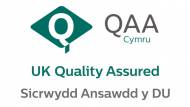BSc (Hons) Counselling (Top-up)
Key Details
- Available at:Rhos-on-Sea
- Study Mode:Part-time, Full-time
- Course Length:
Full-time: 1 year - 2 days a week, Tuesdays and Wednesdays, typically between 9.30am-4pm
Part-time: 2 years - 1 day a week, typically between 9.30am-4pm
START DATE: NEW for September 2026
BSc (Hons) Counselling (Top-up)University-level Courses
Part Time
If you are applying to study part-time you can apply directly to the campus of your choice.
Full Time
If you are applying to study full-time you can apply directly to the campus of your choice.
Course Description
Do you aspire to be a counsellor? The successful completion of this course will provide you with all the knowledge and skills you need to become a Counselling Practitioner. It allows for individual accreditation with the British Association of Counselling and Psychotherapy (BACP) as a Counselling Practitioner.
Fuel your passion for making a difference with this degree, validated and awarded by Bangor University. Learn how to empower others and foster positive and emotional wellbeing.
Could this be your next chapter?
The flexibility of this course which can be studied either full or part-time means you can fit it around commitments you already have. So if you are returning to education or are in employment or already engaging in Counselling practice, and wish to enhance your qualifications and employment status or opportunities, this could be for you.
You will be guided through professional and personal development to enable you to become an autonomous counsellor allied with the British Association of Counselling and Psychotherapy (BACP) ethical framework for good practice. This course meets the requirements for eligibility of BACP accreditation. Modules Include:
- Cognitive and Behavioural Approaches to Counselling (20 credits)
- Final Year Research Project - Dissertation (40 credits)
- Integrating Theory and Skills (20 credits)
- Working with Trauma (20 credits)
- Personal and Professional Development (20 credits)
More detailed information on Modules is to be found in the ‘Campus information’ section.
Entry Criteria
Entry onto this BSc level 6 will be direct for those progressing students from the GLIM Counselling Theory Foundation Degree to the respective GLIM Bachelor Degree (Hons) Counselling, after successful completion of the foundation degree.
Admission will be considered based on candidates' previous academic qualifications, relevant vocational practice, and experience.
Please note a Disclosure and Barring Service (DBS) with enhanced clearance may be required in order to undertake the required course placement hours.
For individuals who do not meet the above academic requirements:
We will consider a wide range of non-standard or professional qualifications and experience, through the submission of a portfolio for accreditation of prior learning (APL/APEL/RPEL), in accordance with GLlM regulations and policies.
If your qualifications do not meet the entry requirements listed above, we would still encourage you to apply for the course you're interested in, as many of our courses will consider learners based on their previous work and skills experience rather than their qualifications.
Delivery
This course is delivered at our University Centre at the Rhos-on-Sea campus, which provides degree-level students with bespoke teaching and learning facilities.
The course will be delivered through a blend of the following:
- Lectures
- Workshops
- Tutorials
- Guest speakers
- Web based learning
- Problem solving group exercises
- Skill practice and skills observation
Speakers may include a range of specialists from partner organisations, agencies and counselling organisations
Timetable:
Full-time: 1 year - 2 days a week, Tuesdays and Wednesdays, typically between 9.30am-4pm
Part-time: 2 years - 1 day a week, typically between 9.30am-4pm
Start date: September 2025
Pastoral Care
The Personal Tutorial system is a major feature of student support and tutorials are an opportunity to discuss a range of issues including progress, progression, work placement support and any additional learning needs.
Fees
Visit our course fees page for information on full and part-time degree course fees.
Financial Support
Visit our financial support page for information on the range of support available.
Additional costs
More detailed information on other costs associated with your course and work placements/work experience (if applicable) will be outlined in the programme validation document and explained to you at your interview.
This could include BACP membership, insurance, supervision, DBS and personal counselling.
Students will also need to consider resources and materials needed for independent study away from college, such as PC/laptop, internet access, software, materials needed for practical development, and if you wish to purchase books/journals, etc, rather than borrow through the library services. Students have free access to the college libraries, study areas and book loan services; however, there is a potential cost for overdue and lost books.
Contact:
For specific course enquiries, please contact: Rachel Curtis (Course Leader) curtis1r@gllm.ac.uk. For general enquiries about our degrees, please contact: degrees@gllm.ac.ukAssessment
Our assessments allow learning to be applied based on your primary interests, vocational experience and placements. For more detailed information on Modules see the ‘Campus information’ section.
Types of assessments include
- Individual portfolios
- Written assignments
- Professional discussion
- Presentation
- Research proposal
- Case studies
- Podcast
- Placement Portfolio of 100 counselling hours
Progression
Where can this course take me in my future career?
Completion of this course can lead to many progression options in education and employment:
- Registered counsellor
- Private/Sessional Counsellor
- School/College Counsellor
- Mental health worker
- Therapeutic work
- Following successful completion of the BSc degree, you could progress to various post-graduate masters degrees Some examples include:
- MA Counselling
- MA Social Work
- MA Criminology and Sociology
- MA Criminology & Criminal Justice
- MA Sociology
- MA Social Policy
- MSc Adult, Children’s or Mental Health Nursing
- MSc Education
- MSc Health, Mental Health & Wellbeing
- MSc Professional Practice in Health
Throughout the year, all GLlM HE students are updated with graduate recruitment fairs locally and further afield e.g. in Liverpool and Manchester. Programme Leaders advise and guide students and liaise with Careers Wales throughout their studies.
GLlM has also introduced Student Futures as part of the current HE strategy, which will enhance the development of learner employability. Previous graduates from GLlM have found employment in local County Borough Councils involved in various projects including Expert Advisory Groups and services for specialist populations. Graduates have also been recruited by various local and national charities addressing social inequality, child protection and substance misuse.
For those studying to develop in their existing profession, having a full foundation degree will demonstrate high-level skills, which can lead to increased career options in a variety of public and private sector contexts, with the possibility of supervisory or managerial responsibilities.
Campus Information Rhos-on-Sea
This course is delivered at our University Centre (UCCL) at the Rhos-on-Sea campus, which provides degree-level students with bespoke teaching and learning facilities. The Centre is equipped with state-of-the-art lecture theatres, seminar rooms, specialist library resources, IT facilities and study areas.
Year 6 Modules:
Cognitive and Behavioural Approaches to Counselling
This module will introduce you to various different cognitive approaches to counselling and consider possible ways of safely and ethically integrating skills and techniques into your current work with clients. To facilitate your understanding and altering maladaptive thought patterns and behaviours, ultimately fostering improved mental health and well-being.
Final Year Project - Dissertation
This module builds upon previous academic skills introduced in earlier aspects of the degree and will support you in developing your research knowledge and skills. It prepares and supports you to undertake an extended piece of independent writing around a topic of your choice related to your area of professional practice supported by an experienced supervisor.
It will allow you to demonstrate depth and breadth of knowledge in a particular area of professional interest. The dissertation will be a mark of your overall academic ability. You will engage in primary or secondary research and be supervised and guided.
Integrating Theory and Skills
This module aims to explore approaches to integrating theory and skills in counselling, providing you with an understanding of the different ways of integrating enhanced counselling skills, such an integrative counselling, and eclectic approach. You will be encouraged to develop their theoretical approach to your counselling
Working with Trauma
This module provides you with the knowledge and skills to work therapeutically with clients who present with symptoms of psychological trauma. You will be introduced to a number of evidence based interventions and techniques to identify work with trauma,shame and toxic guilt to support client’s treatment and recovery.
Personal and Professional Development
This module will encourage you to reflect, communicate and share your increased personal awareness, personal growth and self-acceptance through engaging and interacting in process group sessions. You will relate theoretical ideas and concepts to your own personal development; addressing personal development issues which may inhibit the ability to work effectively with clients developing and enhancing your self-reflective capacity.
You will be encouraged to share your increased self-awareness from the reflective process with the group; to communicate, verbalise and share vulnerabilities developing and demonstrating core moral qualities of a counsellor; personal resilience, integrity, humility and courage.
Other details
Course type: University-level Courses
Level:
6
Programme Area:
- Counselling

